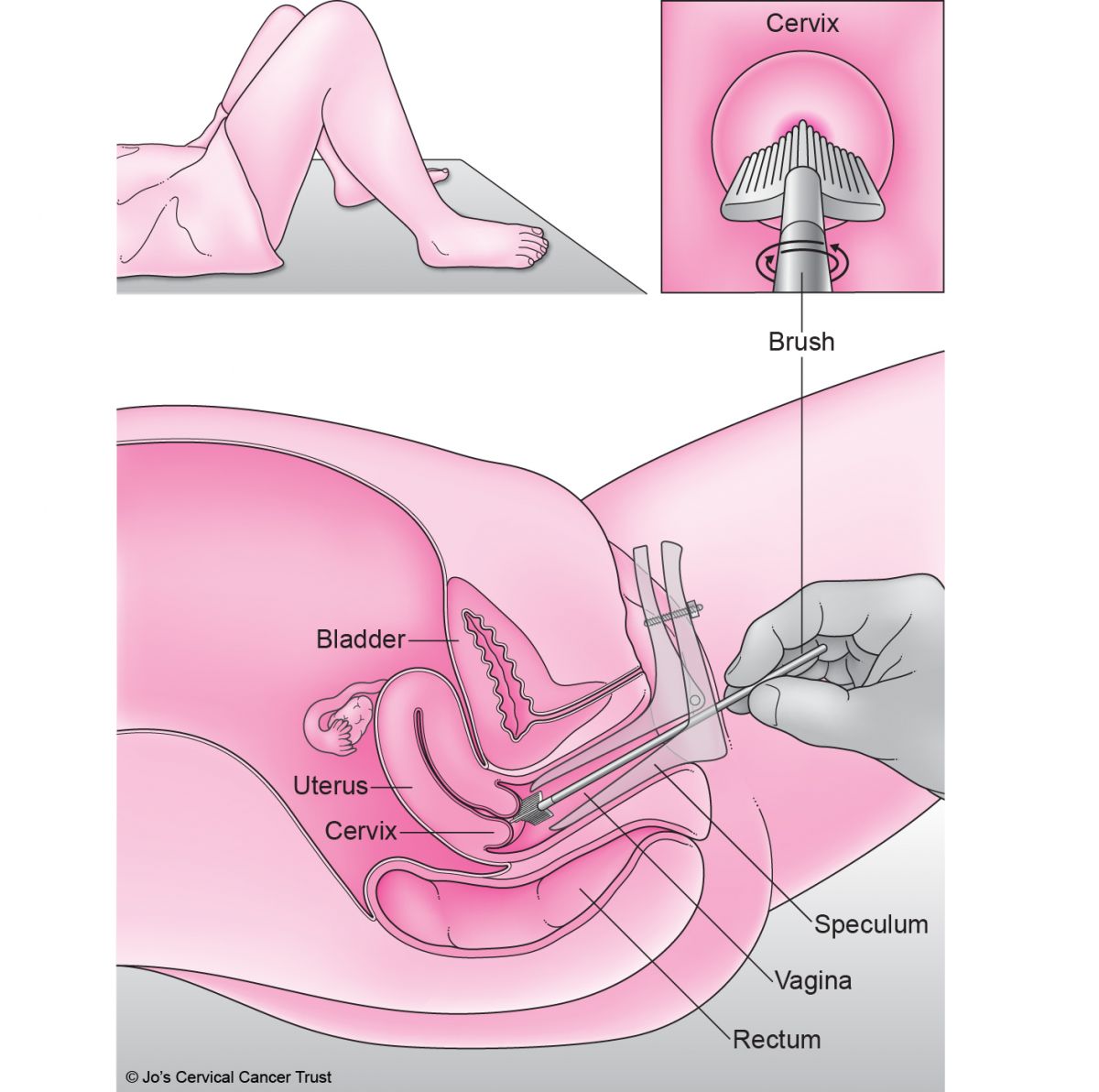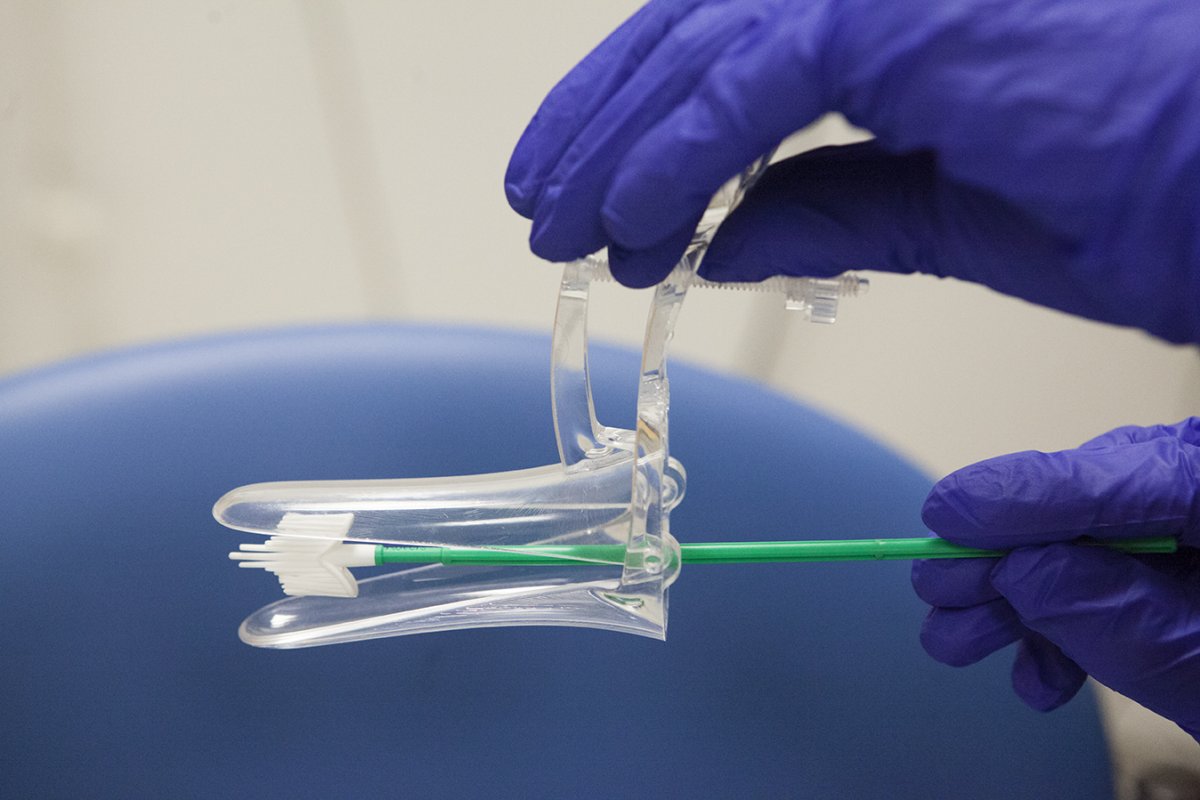What happens at cervical screening?
Last modified: 24 May 2025, 14:15
 At your cervical screening (smear test) appointment, a nurse takes a sample of cells from your cervix using a small, soft brush. The test only takes a few minutes.
At your cervical screening (smear test) appointment, a nurse takes a sample of cells from your cervix using a small, soft brush. The test only takes a few minutes.
If you feel worried about going for cervical screening, you are not alone. It may help to know as much as possible about what going for cervical screening is like. You could ask someone you trust about their experience, speak with your nurse or doctor, or call our free Helpline on 0808 802 8000 for more support.
Joanne, who recently went for cervical screening
Booking your cervical screening appointment
If you are registered with a GP, you will get a letter telling you it is time for your cervical screening appointment. You have to contact your GP to book an appointment. You can usually do this online or over the phone.
In some areas, sexual health clinics offer cervical screening. You may choose to contact your local clinic if you aren’t able to access, or don’t feel comfortable at, your GP surgery.
Read our blog about what to expect at your cervical screening appointment >
Appointment times
At the moment, many GP surgeries are offering cervical screening appointments on set days or at set times. This is a safety measure to help protect you, and their staff, from coronavirus, because it makes sure only a few people are in the surgery at any time.
If you can’t attend any of the available appointments, speak to your GP surgery to see if they can be flexible for you.
Things to think about before booking
- Do not book a cervical screening appointment if you or someone you live with has coronavirus symptoms. You can book an appointment for after you have self-isolated for 10 or 14 days. If you start having coronavirus symptoms after booking, you should cancel your appointment if it falls within the 10 or 14 day self-isolation.
- Write down any questions you want to ask, such as what safety measures they have in place, if you need to wear a face covering, or if your GP surgery any specific instructions for you.
- It is best not to book a cervical screening when you have your period because it can make it harder to get a result.
- You should try not to use spermicide or oil-based lubricant (lube) for 24 hours before the test, as they can affect the results.
What happens at the GP surgery?
Coronavirus means that your GP surgery may be doing appointments a bit differently. Your GP surgery wants to keep you and your healthcare team protected from coronavirus, so they will be following government guidance on social distancing and using appropriate personal protective equipment (PPE) .
This means your visit might be longer than usual. Plan to spend at least 30 minutes at your GP surgery, which may include waiting for your appointment or being directed to the room. The test itself, where your nurse takes a sample of cells from your cervix, will still only take a few minutes.
Arriving at your GP surgery
When you book your appointment, your GP surgery will give you specific details and instructions about when to arrive and what to do once you arrive. They may ask you to:
- arrive as close to your appointment time as possible, so you don’t have to wait long and there is less chance of bumping into other people
- wait outside until you are called in for your appointment, sometimes at a specific door and keeping at least 2 metres away from other people.
You may only see your nurse at your appointment, instead of a receptionist or other health workers. All of this is done to reduce the risk of coronavirus spreading.
You may want to consider wearing a face covering. A face covering is a piece of cloth that covers your nose and mouth (see picture below). A face covering aims to protect the people around you from coronavirus, just like other people wearing face coverings helps protect you.
Someone wearing a face covering

Your cervical screening appointment
A nurse, sometimes called a sample taker, will invite you into a treatment room. They will explain what cervical screening is and check if you have any questions.
Personal protective equipment (PPE)
Your GP surgery will follow local guidance about wearing PPE. If your nurse is wearing PPE, this may include a mask, gloves and apron.
Nurses wearing PPE

Lorraine, who recently went for cervical screening
Your cervical screening test
Your nurse will give you a private space to undress from the waist down, usually behind a curtain. If you are wearing a dress or skirt, you can leave this on and just take off your underwear.
Someone having cervical screening
 Your nurse will ask you to lie on an examination bed and give you a new, clean paper sheet to cover the lower half of your body. You can lie:
Your nurse will ask you to lie on an examination bed and give you a new, clean paper sheet to cover the lower half of your body. You can lie:
- on your back with your legs bent up, your ankles together and your knees apart
- on your left side with your knees bent.
Your nurse will let you know when the test is about to start. First, they gently put a new, clean speculum into your vagina. A speculum is usually a plastic cylinder with a round end – sometimes a metal speculum is used. The speculum is the part that some people find uncomfortable.
Once the speculum is inside your vagina, the nurse will gently open it so they can see your cervix.
Then the nurse will use a small, soft brush to quickly take a sample of cells from your cervix. This may feel a bit strange, but should not be painful.
The nurse will put your sample of cells into a small plastic container (vial) of liquid. The liquid preserves the cells so they can be sent to a lab for testing.
And that’s it! The nurse will take the speculum out of your vagina and give you a private space to dress again. They will explain how and when you should get your results.
Read about how your sample is tested >
A speculum and brush

After your cervical screening appointment
Most people can continue their day as usual after the appointment. Once you are home from your appointment, it is important to follow the government guidance about washing your hands and any face coverings.
You may have some light bleeding (spotting) for a day after the test, so it can help to wear a sanitary pad or panty-liner.
Your cervical screening results should arrive by post within 4 weeks.
Read about cervical screening results >
Cervical screening appointment FAQs
On this page we cover general questions about your cervical screening appointment. We also have detailed FAQs about how coronavirus may have changed your visit to the GP surgery for cervical screening.
Everyone’s experience of cervical screening is different. Some people don’t find it uncomfortable, while for others it may be uncomfortable or hurt. There are lots of reasons, physical and pyschological, for this. It is important to tell your nurse or doctor if cervicals screening is painful for you.
If you want to go for cervical screening, there are ways to make the test more comfortable and make sure you get the right support.
The cervical screening test itself is the same, although your visit to the GP surgery might be a little different. This is because your GP surgery will have safety measures in place to make sure you, and their staff, are protected against coronavirus. We have specific information about how your cervical screening appointment might look at the moment.
No. Jo’s Cervical Cancer Trust is a charity independent of the national cervical screening programme, GP surgeries and other clinics and cannot book a cervical screening appointment for you.
If you want to book a cervical screening appointment, contact your local GP. Some sexual health services in your area may also offer cervical screening.
Read about how coronavirus has affected booking a cervical screening appointment >
How we can help
Whether it’s your first time or you have been before, we know that going for cervical screening may make you feel anxious. It may help to remember that everyone has a different experience of cervical screening. If you need any support, it is important to let your nurse or doctor know.
Read our blog on deciding whether to go for cervical screening >
We have more information about:
- tips for making cervical screening better >
- cervical screening for people with a learning disability >
- cervical screening after sexual violence >
- cervical screening results >
If you have questions or need some emotional support, our Helpline is open on 0808 802 8000.
Check our Helpline opening hours >
We also have a welcoming community in our online Forum, where you can get and give support. There are lots of conversations about cervical screening, so you can choose to read existing threads or post your own messages.
If you have general questions about cervical screening, our Ask the Expert service may be able to help. Submit your question confidentially to our panel of experts and get a tailored reply.
Thank you to all the experts who checked the accuracy of this information, and the volunteers who shared their personal experience to help us develop it.
References
- National Institute for Health and Care Excellence (2017). Clinical Knowledge Summary: Cervical screening. Accessed January 2020.
- Royal College of Nursing (2020). Human Papillomavirus (HPV), Cervical Screening and Cervical Cancer.
- Public Health England (2020). Additional considerations, in addition to standard infection prevention and control precautions, where there is sustained transmission of COVID-19, taking into account individual risk assessment for this new and emerging pathogen, NHS and independent sector. https://assets.publishing.service.gov.uk/government/uploads/system/uploads/attachment_data/file/879111/T4_poster_Recommended_PPE_additional_considerations_of_COVID-19.pdf. Accessed June 2020.
- World Health Organisation (2020). Advice on the use of masks in the context of COVID-19: Interim guidance.
We write our information based on literature searches and expert review. For more information about the references we used, please contact [email protected]
What happens after cervical screening? >
Find out how cervical screening samples are tested.

We’re here for you
Talk to someone about how you’re feeling, ask an expert or connect with others.

